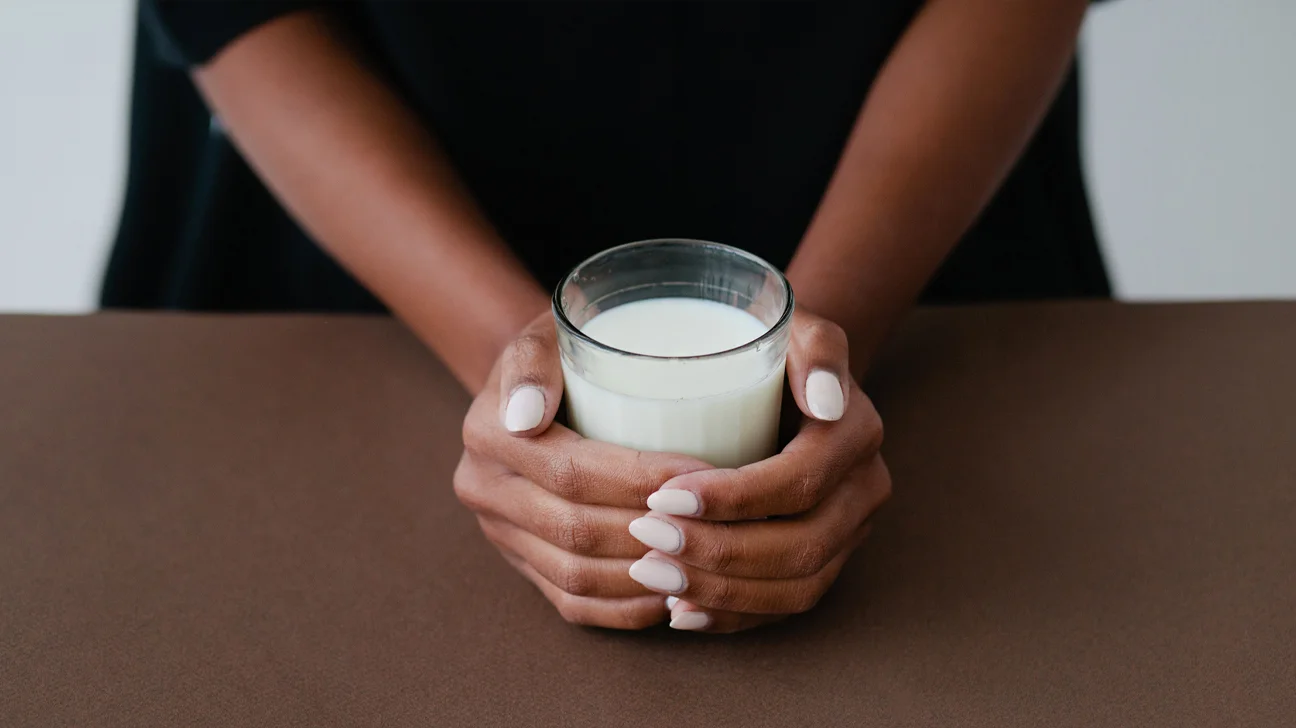Many people turn to warm milk for sleep as a comforting, natural aid for relaxation and rest. The idea of drinking a warm glass of milk before bed has been a part of sleep routines for generations. It’s often cited as a natural remedy to promote relaxation and ease the transition to sleep. But how effective is warm milk at helping people sleep, and is there science to support its use as a sleep aid? In this post, we’ll examine the research behind warm milk’s effects on sleep, how specific components like tryptophan and melatonin contribute to sleep regulation, and other sleep-promoting tips and foods that can be part of a healthy bedtime routine.
1. The Tradition of Warm Milk for Sleep
Warm milk before bed is a long-standing home remedy for better sleep. While traditions like these have become ingrained in many cultures, modern science has sought to understand whether there is physiological merit to the practice. The general theory is that warm milk helps relax the body and mind, creating a sense of comfort that makes it easier to fall asleep. Additionally, warm milk is believed to contain certain chemical compounds that contribute directly to sleep.
2. Why Does Warm Milk Make You Sleepy?
Two primary compounds in milk are believed to play a role in promoting sleep: tryptophan and melatonin. Here’s a closer look at how each works:
a. Tryptophan: An Amino Acid That Promotes Relaxation
Tryptophan is an amino acid found in milk and other protein-rich foods. It is a precursor to serotonin, a neurotransmitter that influences mood and relaxation. When serotonin levels rise, the brain becomes more relaxed, which in turn promotes the production of melatonin, the hormone responsible for regulating sleep-wake cycles.
- Role in Melatonin Production: Tryptophan is critical in melatonin synthesis, as it helps the brain produce this hormone in response to darkness. Melatonin, released by the pineal gland, signals to the body that it’s time to sleep, lowering body temperature and inducing drowsiness.
- Mood Enhancement: Because serotonin also regulates mood, tryptophan-rich foods can contribute to a calm and positive mental state, creating ideal conditions for sleep.
b. Melatonin: A Sleep-Regulating Hormone
Melatonin is known as the “sleep hormone” due to its significant role in controlling sleep-wake cycles. Melatonin production increases in response to darkness and helps the body maintain circadian rhythms. While melatonin is naturally produced by the body, some foods, including milk, contain small amounts of melatonin, which may boost melatonin levels when consumed before bed. According to research on sleep and dietary patterns, melatonin-enriched foods may promote sleep onset and improve sleep quality (Frontiers in Psychology).
3. Does Science Support Drinking Warm Milk for Sleep Better?
Research on the effects of warm milk on sleep is limited, but available studies indicate positive results, especially when milk is combined with other relaxation practices. Here are a few key studies and findings:
- Study on Hospital Patients: In one study involving heart patients in a hospital, drinking warm milk with honey for three days was associated with improved sleep. Participants reported falling asleep more quickly and experiencing fewer nighttime awakenings (Clinical Nutrition ESPEN).
- Study in Older Adults: A study involving adults over 65 found that those who drank milk and engaged in physical activity reported improvements in sleep quality. Participants who drank milk before bed fell asleep more easily than those who did not, indicating milk’s potential benefits for age-related sleep issues (BMC Geriatrics).
While these studies are promising, experts emphasize that drinking milk alone may not be sufficient for sleep improvements and should be paired with good sleep hygiene practices.
4. Potential Health Benefits of Drinking Milk Before Bed

Beyond promoting sleep, milk has additional health benefits, especially when consumed before bed.
a. Muscle Recovery and Fitness
A study on milk’s effects on muscle recovery showed that consuming milk post-exercise can aid in muscle repair and growth, especially for those who work out regularly. For people who exercise at night, drinking milk before bed may support muscle recovery during sleep, when growth hormone production peaks (Physical Activity and Nutrition).
b. Caloric Balance and Morning Metabolism
There is some evidence that drinking milk before bed may increase resting metabolic rate (the number of calories burned while at rest) the next morning. This suggests that milk before bed may help the body burn calories more effectively during sleep, though more research is needed to confirm these effects (Nutrients).
5. Addressing Common Concerns with Drinking Milk Before Bed
While warm milk is generally considered safe, some individuals may have concerns regarding its consumption close to bedtime. Here are some commonly asked questions:
a. Does Milk Cause Weight Gain if Consumed at Night?
Contrary to popular belief, drinking milk at night in moderation is unlikely to contribute significantly to weight gain. The calories in a single glass of milk are minimal and are balanced by the body’s caloric needs for recovery processes during sleep. However, excessive milk consumption, or pairing milk with high-calorie snacks, may contribute to weight gain.
b. Does Milk Increase Mucus Production?
Some people worry that milk consumption leads to mucus production or worsens congestion. However, research shows no strong link between milk and mucus production. In fact, a review by the Journal of the American College of Nutrition found that milk does not cause increased mucus in the general population, debunking this common myth (Journal of the American College of Nutrition).
c. Can Milk Cause Sleep Disruptions?
While milk itself is generally sleep-friendly, those who are lactose intolerant or have a dairy allergy should avoid it, as digestive discomfort can disrupt sleep. People with these conditions may benefit from non-dairy alternatives, such as almond or oat milk.
6. Alternatives to Warm Milk for Promoting Sleep
For those who cannot or prefer not to drink milk, various other foods and beverages can support sleep due to their tryptophan or melatonin content.
a. Tryptophan-Rich Foods
Tryptophan is present in several protein-rich foods, making it easy to incorporate into a pre-sleep snack:
- Turkey and Chicken: Known for their high tryptophan content, poultry is a popular protein choice for promoting sleep.
- Nuts and Seeds: Pumpkin seeds, sunflower seeds, and peanuts offer a plant-based source of tryptophan.
- Soy Products: Soybeans and tofu are also good sources of tryptophan, making them suitable for plant-based diets.
b. Melatonin-Rich Foods
Certain foods naturally contain melatonin, which may help regulate sleep patterns:
- Cherries: Tart cherries have high melatonin levels and have been studied for their sleep-promoting effects.
- Bananas: High in magnesium and potassium, bananas help relax muscles and contain small amounts of melatonin.
- Oats and Barley: These whole grains contain melatonin, along with complex carbohydrates that stabilize blood sugar overnight.
7. Sleep Hygiene Tips to Complement Your Bedtime Routine
Drinking warm milk or eating melatonin-rich foods can be a part of a bedtime routine, but additional sleep hygiene practices are essential for maximizing sleep quality.
a. Maintain a Consistent Sleep Schedule
Going to bed and waking up at the same time each day helps regulate the body’s internal clock, promoting natural sleep-wake cycles. Aim to maintain this schedule even on weekends.
b. Avoid Stimulants Before Bed
Caffeine, nicotine, and even large, heavy meals can interfere with sleep. Avoid stimulants at least 4-6 hours before bed to ensure your body is in a relaxed state.
c. Limit Screen Time
Exposure to blue light from phones, computers, and TVs can disrupt melatonin production. Consider limiting screen time at least an hour before bed to support your body’s natural melatonin production.
d. Create a Relaxing Pre-Sleep Routine
Incorporating relaxation practices like deep breathing, meditation, or light stretching can signal to the body that it’s time to wind down. Combining these techniques with a cup of warm milk or a tryptophan-rich snack can create a holistic routine for better sleep.
Conclusion: Is Warm Milk for Sleep the Right Routine?
Warm milk can be a comforting addition to a bedtime routine, particularly for those who enjoy its relaxing effects and mild flavor. The presence of tryptophan and melatonin in milk may help some individuals fall asleep more easily, especially when combined with other relaxation practices. However, warm milk is not a miracle cure for sleep issues, and those struggling with chronic insomnia may need to address lifestyle factors or consult with a healthcare provider.
If you are lactose intolerant, allergic to dairy, or simply don’t enjoy milk, consider trying other sleep-friendly foods and drinks, such as cherry juice or herbal teas. With a consistent sleep schedule, good sleep hygiene, and the right nutritional support, you can create an effective routine for achieving restful, rejuvenating sleep.
Enhance your sleep routine with our carefully selected products designed to support restful nights. From premium ergonomic pillows that cradle your head and neck to calming herbal teas and melatonin-enriched supplements, our collection provides everything you need to unwind and drift off naturally. Visit our shop to discover sleep solutions tailored to help you achieve deeper, more refreshing rest every night.


